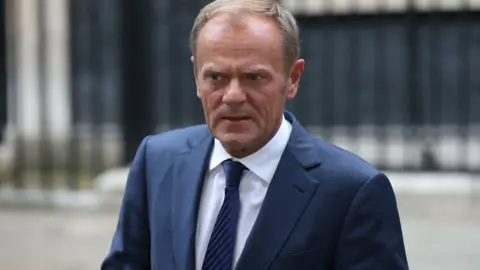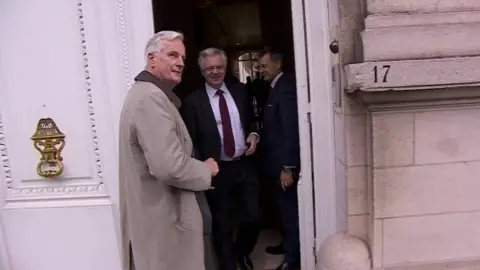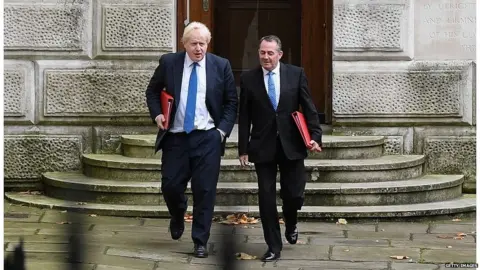Brexit: Donald Tusk warns over 'slow pace' of talks
 PA
PAThe green light to begin talks about a post-Brexit trade deal won't come until December at the earliest, the European Council president has suggested.
Donald Tusk warned that if the current "slow pace" of negotiations continues the UK and the EU "will have to think about where we are heading".
The UK has been hoping EU leaders will decide next week that enough progress has been made to open trade talks.
Brexit Secretary David Davis is in Brussels as negotiations continue.
He held a working lunch with EU lead negotiator Michel Barnier, which the French politician said had been "good" and "constructive".
In an LBC interview, Theresa May - who voted Remain last year - would not say how she would vote if another referendum was held.
"I don't answer hypothetical questions," the PM said.
On the negotiations, she said the two sides were "very close" to a deal on citizens' rights.
But she said she was not able to guarantee the rights of all EU citizens currently living in the UK, since if the UK and the EU were not able to reach a wider deal on the terms of exit, this would impact on welfare payments and other issues.
She rejected suggestions the UK was playing catch-up, saying its negotiators were "exceptionally well prepared" and the reason there would be a pause in talks on Wednesday was the EU had not scheduled them.
'Good faith'
The UK is hoping the EU will agree to move on from the initial phase of talks, covering the financial settlement, Northern Ireland and citizens' rights, to discussing future issues like trade.
A decision on whether to agree this will be taken at a European Council summit on 19 October.
But Mr Tusk all but ruled this out in a speech in Brussels, saying: "We are negotiating in good faith, and we still hope that the so-called 'sufficient progress' will be possible by December.

"However, if it turns out that the talks continue at a slow pace, and that `sufficient progress' hasn't been reached, then - together with our UK friends - we will have to think about where we are heading."
The UK is set to leave the European Union at the end of March 2019.
Both EU and UK teams have said the ball is in the other side's court this week - implying that it is the other side that has to make the next concession.
Asked by the BBC whose court he thought "the ball is in", Mr Barnier warned that "Brexit is not a game".
'No deal' planning
This week's fifth round of talks came as ministers sought to ease disquiet among Brexit-backing MPs about the UK's strategy for a two year "transition" period between being a full EU member and the UK's eventual post-Brexit relations with the EU.
Downing Street said it wanted the process to be "as smooth as possible".
After Mrs May briefed her cabinet on Tuesday, a No 10 spokesman said the government hoped to negotiate a deal with the EU on the terms of exit but was prepared for all eventualities - a reference to what some believe is the growing likelihood of a "no deal" scenario.
Mr Tusk said the EU side was not preparing for such a scenario.
Taking questions from MPs on Monday, Mrs May also confirmed that the UK could remain subject to the rulings of the European Court of Justice during a planned two-year transition period after Britain leaves the EU in March 2019.
This was criticised by some pro-Leave campaigners, with backbencher Jacob Rees-Mogg telling the BBC he was "troubled" by the PM's statement.
"If we're remaining under the jurisdiction of the ECJ then we haven't left the European Union or the date of departure is being delayed," he said.
 Getty Images
Getty ImagesForeign Secretary Boris Johnson and Environment Secretary Michael Gove - two key figures in last year's Leave campaign - both issued statements backing Mrs May's comments.
BBC assistant political editor Norman Smith said their intervention underlined the government's nervousness about the reaction of Tory Brexiteers over the European Court of Justice's jurisdiction - which for many of them is a "red line".
Mr Johnson, who has been accused of undermining the PM with his recent interventions on Brexit strategy, issued a statement backing her "powerful vision".
On Twitter, Environment Secretary Mr Gove said: "Strong statement from PM on Brexit - let's be pragmatic over implementation to secure maximum freedom to diverge from EU in end state."
Asked on Tuesday about the role of the ECJ during a transitional phase, No 10 said business should only have to adjust to one set of changes following the UK's departure.
But it reiterated the PM's hope that a new dispute resolution system could be devised as quickly as possible to assume the ECJ's functions and settle the matter once and for all.
